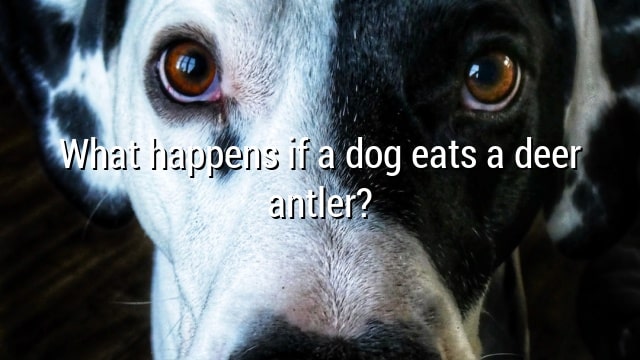There is no definitive answer to this question as it depends on the size and composition of the antler, as well as the dog’s diet. Some dogs may experience minor stomach upset after consuming deer antler, while others may not have any adverse effects at all. It is generally recommended that dogs not consume large amounts of deer antler due to potential health concerns, but small amounts (less than 2 ounces) are typically safe for most dogs.
Can I give my dog a deer antler I found in the woods?
Yes, you can give your dog a deer antler if it is from a legal hunting animal.
How do you sterilize deer antlers for dog chews?
There are a few ways to sterilize deer antlers for dog chews. One way is to boil them in water for three minutes. Another way is to immerse them in a solution of 1 part bleach to 9 parts water for thirty minutes.
How long do you boil an antler for a dog?
Boil for 3 minutes.
Can deer antlers make dogs sick?
There is no evidence that deer antlers have any negative effect on dogs. Some people may believe this to be the case because they have seen misinformation online, but there is no scientific evidence to support this claim.
When should I take antlers off my dog?
Most dogs will naturally shed their antlers every six to twelve months, but it is always best to check with your veterinarian before removing them.
Are split or whole antlers better for dogs?
There is no definitive answer to this question as it depends on the individual dog’s weight and bone structure. Generally speaking, whole antlers are better for heavier dogs as they can support more weight, whereas split antlers may be better for smaller or lighter dogs as they can distribute the weight more evenly.
Can deer antlers give dogs diarrhea?
There is no evidence that deer antlers can give dogs diarrhea. However, if your dog has been eating a lot of deer antler products, it’s possible that he may be getting a little too much calcium. Calcium can be helpful in building strong bones and teeth, but too much of it can be harmful if it’s not balanced with other nutrients.
What do vets recommend for dog chews?
There is no one definitive answer to this question as different dogs will enjoy different types of chews. However, some popular chew toys that are recommended by vets include Kongs, Nylabones, and Rawhide chews.
Do you have to prepare deer antlers for dogs?
There is no need to prepare deer antlers for dogs – they will simply enjoy gnawing on them!
What is the hardest antler for dogs?
There is no definitive answer to this question as it depends on the size and shape of the antlers of the dog in question. However, some antlers that may be harder to chew are those with a pointed tip or those that are curved.
Should I boil deer antlers?
There is no scientific evidence that boiling deer antlers improves any health benefits. In fact, there is some evidence that boiling deer antlers may actually increase the risk of infection.
How can I make my dogs antlers softer?
There are a few things you can do to make your dog’s antlers softer. One is to bathe them regularly, especially if they have dry skin. You can also give them a good brushing every week or so. Another option is to use a product called velvet antler powder, which is made from deer velvet and is often used in veterinary hospitals to help soften hard tissue in animals’ bodies.
What are the best antlers for dogs?
There is no definitive answer to this question as it depends on your dog’s size, breed, and preference. Some popular antlers for dogs include elk, deer, moose, and caribou.
Are elk antlers bad for dogs?
There is no definitive answer to this question as it depends on the specific dog and their diet. Some dogs may find elk antlers unpalatable and may try to avoid them, while others may enjoy them. It is always best to consult with a veterinarian if your dog has any dietary concerns.
